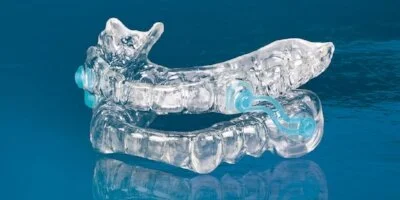Night (Mouth) Guards and Snore Guards
By guest blogger Dr. Mohamed Abdel Hamid BDS, MFDS RCSEd, Member of AACD
What is teeth grinding?
Teeth grinding is when your upper and lower teeth come into contact with each other forcefully. Most people probably grind their teeth from time to time. Occasional teeth grinding, medically called bruxism, does not usually cause harm, but when teeth grinding occurs on a regular basis the teeth can be damaged and other oral health complications can arise, such as your teeth getting worn or your jaw starts to be sore.
Your dentist will make a mold which will then be sent to a lab.
Your dentist will make a mold which will then be sent to a lab.
Why Do People Grind Their Teeth?
Although teeth grinding can be caused by stress and anxiety, it often occurs during sleep and is more likely caused by an abnormal relation between upper and lower jaws, or missing or crooked teeth. It can also be caused by a sleep disorder such as sleep apnea.
How do I know that I grind my teeth, and what do I do then?
Because grinding often occurs during sleep, most people are unaware that they grind their teeth. However, a dull, constant headache or sore jaw when you wake up is a telltale symptom of bruxism. Also occasionally, people learn that they grind their teeth by their loved one who hears the grinding at night.
If you suspect you may be grinding your teeth, talk to your dentist. He or she can examine your mouth and jaw for signs of bruxism, such as jaw tenderness and excessive wear on your teeth. The dentist then is going to prescribe a treatment for you, which my include medication, exercise and most probably, he or she will have to make you a night guard.
What is a night guard?
Night guard for bruxism
Night guard for bruxism
A night guard is a device placed in the mouth on top of the teeth to help with grinding. The guard acts as a protective layer between your top and bottom teeth.
These even out the pressure across your jaw and create a physical barrier between your upper and lower teeth to protect them from further damage. They can also reduce any grinding noises you make at night.
Night guards are similar in appearance to those used in sports such as boxing. They are also available to buy from your local pharmacist. However, it's unlikely to fit as well as one made by your dentist.
The type of the night guard varies according to its use, it is available in different thicknesses (1 to 4 mm) and usually made of rubber. However, if they are used for a different condition than grinding ( such as sport protector or jaw treating device ), they are usually made of hard plastic. Another modification of the night guard which can also be made by your dentist is the snore guard.
What Happens If I Don’t Wear My Night Guard?
Not following your dentist’s instructions regarding when and how you wear your night guard can have a huge effect on your dental health, as well as your general health. Problems range from something as simple as increased teeth sensitivity and increased chance of decay, to something much more serious such as problems with your jaws’ joint and bone, which most dentists will tell you is extremely difficult to treat. That’s why following your dentist’s instructions are of utmost importance.
What is snoring?
Snoring is the vibration of respiratory structures and the resulting sound due to obstructed air movement during breathing while sleeping. In some cases, the sound may be soft, but in most cases, it can be loud and unpleasant. Snoring during sleep may be a sign, or first alarm, of obstructive sleep apnea.
What is a snore guard?
Snore Guard is an anti-snoring device that claims to prevent snoring before it starts. It is similar to the mouth guard or protector with a small modification, depending on the type. One type holds your lower jaw forward in relation to the upper jaw, another type helps keeping your tongue depressed downward. These actions help to open your airway passages and thus help you to breathe better, which prevents the cause for snoring.
Snore guard
Snore guard
Can this be made by the dentist?
Of course. A well trained dentist should be able to identify the problem readily, will then ask about the cause and take proper history, and then either refer you to a specialist or fabricate the device himself since its very similar to a night guard. The advantage of this is that the dentist is trained to make adjustments to your device so that it suits you better, unlike ready made devices. Another hidden advantage is that you get to visit the dentist periodically, which can help in identifying if you have other teeth related problems.
Our thanks to Dr. Hamid for an interesting and informative article.
If you need a gentle, caring dental team, please call Jennifer Fineberg’s office at (623) 362-2550. We’ll give you the very best dental care we can!


